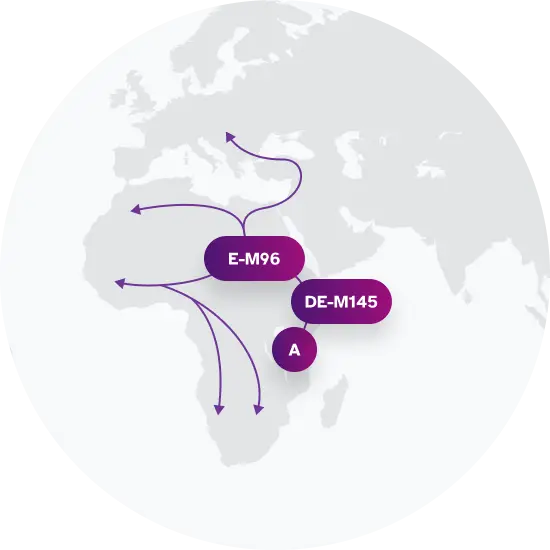Haplogroup E-P252
What is Paternal Haplogroup E-P252?
Haplogroup E-P252, also known as Haplogroup E-M96 (Y Chromosome Consortium long-form label), is a genealogical group of lineages defined by unique genetic markers present on the Y-chromosome. Your paternal haplogroup, or that of your father if you do not have a Y-chromosome, paints a picture of your ancient origins and the migrations of your ancestors. Although your paternal haplogroup reflects just one of your many ancestral lineages, it carries information about that lineage over tens of thousands of years.
Haplogroup E-P252 is descended from haplogroup E-M96. Among 23andMe research participants, haplogroup E-P252 is commonly found among populations in the United Kingdom.
It's important to note that your haplogroup doesn't define your current ethnic identity; rather, it provides an insight into your deep ancestry on the paternal side.
 Paternal Haplogroup Origins E-M96
Paternal Haplogroup Origins E-M96Top Surnames with Haplogroup E-P252
For surnames with sufficient representation in the data, these percentages represent the frequency with which each surname is found in individuals exhibiting this genetic marker.
Haplogroup E-P252 is linked to Ramesses III
Pharaoh Ramesses III defended Egypt in three consecutive wars during his approximately 30-year reign, but provoked dissent within his administration. Catalyzed by mounting internal strife, one of Ramesses's lesser wives, Tiye, hatched a plot to have her son, Pentawer, usurp the throne by having Ramesses III murdered along with his appointed heir. A papyrus record of the resulting trial explains that the plot failed and that all involved were tried and convicted.However, a modern CT scan of Ramesses III's mummy revealed a deep slit in his throat, reopening a case long thought closed. The embalmers went to great lengths to cover up other wounds, including fashioning a fake toe out of resin where Ramesses's real one had been hacked off, likely during a fatal attack. For thousands of years, Ramesses's burial adornments concealed the wounds that mark one of the most famous royal dramas in history. Ramesses III's paternal lineage belongs to haplogroup E-V38.

